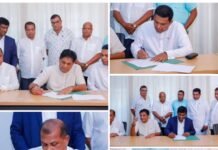- The onus is on professionals to prevent this era from happening again
- Development of tourist center from Nilaveli to Arukambai
President Ranil Wickremesinghe said that following the strategic program initiated by the government to stabilize the country’s economy, if it is not carried forward, it will go back to the age of order and it is the responsibility of all professionals to prevent that situation.
The President made this known in a meeting held at the Batticaloa Sunshine Hotel with business professionals from the Batticaloa district. The event was attended by doctors, engineers, women’s organizations, trade associations and representatives of non-governmental organizations.
Identifying the potential of the historic Batticaloa and Trincomalee districts, the President explained the work plans that the government has initiated for its development, and also explained the development plans including developing the area from Nilaveli to Arukambai as a major tourist center and building fifty massive hotels.
After that, the President also attended a meeting with the Batticaloa District Bar Association.

Explaining about establishing free trade agreements with Southeast Asian countries along with the Regional Comprehensive Economic Partnership (RCEP), the President also discussed the country’s new economic reform process and legal amendment with the lawmakers. The President clarified on the government’s plan to develop Hingurangoda airport for landing of international flights and the steps taken to develop Batticaloa and Kalmunai areas as major educational centers.
Batticaloa District Bar Association President D. Shivanathan, Secretary H.I.Ajith and many lawyers participated in it.
A meeting of Batticaloa district civil activists was also held at Batticaloa East Lagoon Hotel under the leadership of President Ranil Wickramasinghe. In relation to key economic and development strategies to stabilize and revitalize the economy,
During this the President briefed the representatives of the civil organizations.
Explaining the economic challenge facing the country, the President also emphasized the importance of working in accordance with the agreements with the International Monetary Fund (IMF) to ensure financial stability.
Pointing out the importance of the agreements made with the International Monetary Fund and creditor countries, President Ranil Wickremesinghe said that by trying to change these agreements, the country would lose the financial support it should get. The President clarified here about the possible adverse effects of changing the IMF agreements.
The President clarified the plan to transform Sri Lanka into an export-based economic country by 2035 and mentioned that the Economic Exchange Act was brought for that purpose.
The president also focused on the problems arising in relation to the distribution of power between the provinces and said that his aim is to strengthen the provincial councils in order to reduce the burden of the central government and distribute development to the provinces.
Eastern University Vice-Chancellor Senior Professor V. Kanagasingam, Union President of Civil Organizations S. Mamankaraja, Vice President M. Many union members of civil organizations, including Selvaraja, also attended the event. Also, Eastern Province Governor Senthil Thondaman, President’s Senior Adviser on National Security and Chief of the Presidential Task Force Sagala Ratnayake also attended the meeting with the President.









